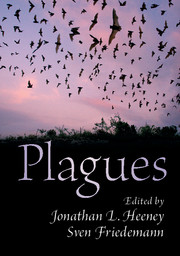Book contents
- Frontmatter
- Dedication
- Contents
- List of Figures
- List of Tables
- Notes on Contributors
- Foreword
- Preface
- Acknowledgements
- 1 Ebola: The Plague of 2014/2015
- 2 Plagues and History: From the Black Death to Alzheimer's Disease
- 3 Plagues and Medicine
- 4 The Nature of Plagues 2013–14: A Year of Living Dangerously
- 5 Plagues, Populations and Survival
- 6 Plagues and Socioeconomic Collapse
- 7 Silicon Plagues
- 8 The Human Plague
- 9 Plague as Metaphor
- Index
Preface
Published online by Cambridge University Press: 24 March 2017
- Frontmatter
- Dedication
- Contents
- List of Figures
- List of Tables
- Notes on Contributors
- Foreword
- Preface
- Acknowledgements
- 1 Ebola: The Plague of 2014/2015
- 2 Plagues and History: From the Black Death to Alzheimer's Disease
- 3 Plagues and Medicine
- 4 The Nature of Plagues 2013–14: A Year of Living Dangerously
- 5 Plagues, Populations and Survival
- 6 Plagues and Socioeconomic Collapse
- 7 Silicon Plagues
- 8 The Human Plague
- 9 Plague as Metaphor
- Index
Summary
Human history, evolution and even our religious and cultural practices have been greatly influenced by plagues of infectious diseases. The Zika virus epidemic in South America has left a generation of children with microcephaly and raised concerns about infections acquired during large international gatherings such as the 2016 Olympic Games in Rio de Janeiro. The year 2014 will be remembered as the year that a highly contagious and deadly viral disease, Ebola, for the first time moved into large urban populations and quickly became a plague of high mortality and affliction. It directly affected three West African nations and their neighbouring countries, while threatening other nations around the globe. The 2014 Darwin College lecture series ‘Plagues’ had been conceived 18 months earlier, based not on a premonition of an Ebola epidemic, but on the inevitability of an outbreak of one of the many emerging and re-emerging infectious diseases from around the world. The ‘Plague’ lecture series and this book transcend the medical aspects of plagues by remaining true to the tradition of the multidisciplinary engagement of a single theme examining plagues of different types as well as those affecting other species in addition to humans. Plagues draws not only from the biological and medical sciences but also a spectrum of diverse fields such as those which infect our digital global network, threaten our financial institutions, and which have even influenced our language and literature. Intentionally, the sequence and the content of the chapters diverge from the platform lectures, which were limited in time and scope, thus now providing the reader with greater depth, detail and a broader conceptual perspective.
Due to an unfortunate coincidence, the ‘Plague’ lecture series was immediately followed by confirmation of the largest outbreak of one of humankind's most feared infections, Ebola. We have therefore most appropriately included a chapter ‘Ebola, the Plague of 2014/15’. This large-scale epidemic engulfed West Africa and threatened International borders. It took more lives than all other recorded Ebola outbreaks before it and dominated international headlines for two years. This contemporary plague began unrecognised with the death of a two-year-old boy in December 2013, a month before the Darwin College lecture series on plagues would start. Tragically, because Ebola was unknown to West Africa it was misdiagnosed until late March 2014.
Information
- Type
- Chapter
- Information
- Plagues , pp. xxi - xxixPublisher: Cambridge University PressPrint publication year: 2017
